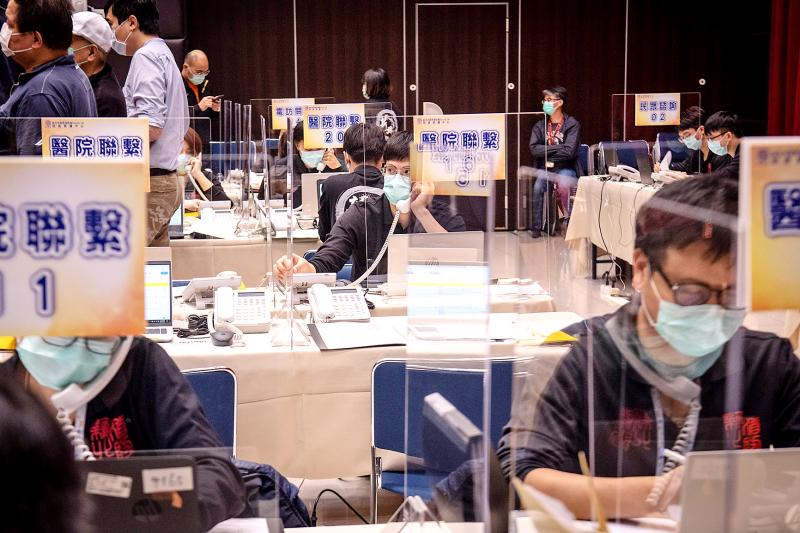People aged 65 or older who have tested positive for COVID-19 using a rapid test would be eligible for oral antiviral drugs prescribed by a doctor, the Central Epidemic Command Center (CECC) said yesterday.
Minister of Health and Welfare Chen Shih-chung (陳時中), who heads the center, said that after meetings with local governments and specialists over the weekend, they agreed that the administration of oral antiviral drugs to high-risk groups should be accelerated.
The center proposed that people aged 65 or older, despite not falling under the center’s “three conditions” — being under home quarantine, home isolation or practicing self-disease prevention — who test positive using an at-home rapid test for COVID-19 should also be eligible for oral antiviral drugs prescribed by a doctor, Chen said.

Photo: Reuters
“There were different opinions on whether they should be considered confirmed COVID-19 cases, but we reached a consensus that they should be eligible for the antiviral drugs, after seeing a doctor and receiving a prescription,” he said.
The policy would be implemented as soon as the supplementary measures are decided on by the center and local governments, Chen said.
After a local media outlet yesterday reported that the Executive Yuan and the center had been discussing late into the night on Saturday whether long-term care facility residents who test positive with a rapid test should be eligible for oral antiviral drugs, the CECC yesterday said that the policy had already taken effect on May 5.

Photo: CNA
After checking with the Executive Yuan, it confirmed that no such meeting was held on Saturday, said Centers for Disease Control (CDC) Deputy Director-General Philip Lo (羅一鈞), deputy head of the CECC’s medical response division.
Over the past few days, the number of oral antiviral drugs prescribed for COVID-19 has risen, and the center would continue to work on easing the procedures for prescribing them to more people, Chen said.
CECC data showed that 876 courses of Paxlovid and 149 courses of molnupiravir were prescribed on Saturday.

Taiwan is projected to lose a working-age population of about 6.67 million people in two waves of retirement in the coming years, as the nation confronts accelerating demographic decline and a shortage of younger workers to take their place, the Ministry of the Interior said. Taiwan experienced its largest baby boom between 1958 and 1966, when the population grew by 3.78 million, followed by a second surge of 2.89 million between 1976 and 1982, ministry data showed. In 2023, the first of those baby boom generations — those born in the late 1950s and early 1960s — began to enter retirement, triggering

ECONOMIC BOOST: Should the more than 23 million people eligible for the NT$10,000 handouts spend them the same way as in 2023, GDP could rise 0.5 percent, an official said Universal cash handouts of NT$10,000 (US$330) are to be disbursed late next month at the earliest — including to permanent residents and foreign residents married to Taiwanese — pending legislative approval, the Ministry of Finance said yesterday. The Executive Yuan yesterday approved the Special Act for Strengthening Economic, Social and National Security Resilience in Response to International Circumstances (因應國際情勢強化經濟社會及民生國安韌性特別條例). The NT$550 billion special budget includes NT$236 billion for the cash handouts, plus an additional NT$20 billion set aside as reserve funds, expected to be used to support industries. Handouts might begin one month after the bill is promulgated and would be completed within

The National Development Council (NDC) yesterday unveiled details of new regulations that ease restrictions on foreigners working or living in Taiwan, as part of a bid to attract skilled workers from abroad. The regulations, which could go into effect in the first quarter of next year, stem from amendments to the Act for the Recruitment and Employment of Foreign Professionals (外國專業人才延攬及僱用法) passed by lawmakers on Aug. 29. Students categorized as “overseas compatriots” would be allowed to stay and work in Taiwan in the two years after their graduation without obtaining additional permits, doing away with the evaluation process that is currently required,

IMPORTANT BACKER: China seeks to expel US influence from the Indo-Pacific region and supplant Washington as the global leader, MAC Minister Chiu Chui-cheng said China is preparing for war to seize Taiwan, Mainland Affairs Council (MAC) Minister Chiu Chui-cheng (邱垂正) said in Washington on Friday, warning that Taiwan’s fall would trigger a regional “domino effect” endangering US security. In a speech titled “Maintaining the Peaceful and Stable Status Quo Across the Taiwan Strait is in Line with the Shared Interests of Taiwan and the United States,” Chiu said Taiwan’s strategic importance is “closely tied” to US interests. Geopolitically, Taiwan sits in a “core position” in the first island chain — an arc stretching from Japan, through Taiwan and the Philippines, to Borneo, which is shared by